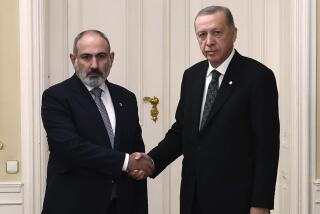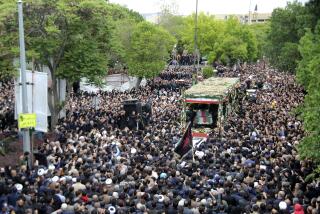Armenian church declares genocide victims saints in somber ceremony
Istanbul — In a somber pageant of color and ritual, Armenia’s national church Thursday honored the victims of the Ottoman Empire’s deportations and massacres of a century ago by canonizing them en masse as martyrs.
In Istanbul, meanwhile, Turkish President Recep Tayyip Erdogan chided Armenia and the Armenian diaspora for focusing only on their losses during what he called “a relocation of the Armenian population to the farther parts of the empire.”
“Thirty million people died, and why are you highlighting the Armenian citizens?” he said. “More than 4 million Muslims died during the war.”
Karekin II, who carries the titles supreme patriarch and catholicos of all Armenians, said that by honoring the victims of a century ago, “the church only recognizes what happened: that is genocide.”
“During the dreadful years of the genocide of the Armenians, millions of our people were uprooted and massacred in a premeditated manner, passed through fire and sword, tasted the bitter fruits of torture and sorrow,” he said in the open-air ceremony at Edjmiadzin, the see of the Armenian Apostolic Church, just outside the capital of Yerevan. It was the first canonization in the ancient church in four centuries
Historians say that at least 1 million Armenians perished in the deportations and massacres that took place during World War I in the waning days of the Ottoman Empire. Erdogan said the number that Armenians cite, 1.5 million, is an exaggeration.
“The numbers used by Armenians have no basis and no reason,” he told a crowd of more than 1,000 as he concluded a “peace summit” to mark the centenary of the Allied landing at the head of the Dardanelles Strait during the war.
Then he added, “We feel sorry and sad for Armenians who died in World War I.”
Erdogan spoke midway through a two-day commemoration of Gallipoli, where Allied troops tried and failed to seize a key promontory to the Dardanelles that would have allowed them to capture Constantinople, as Istanbul was then known.
The Gallipoli battle began on the same day that the Ottoman Empire began deporting Armenian political and intellectual leaders from Constantinople. But Erdogan’s decision to stage a series of major events surrounding Gallipoli appeared to be in direct competition with events in Armenia, a decision that incensed the Armenian government.
The expression of “feeling sad and sorry” fell well short of Armenia’s demand that he acknowledge the mass deaths as a genocide. Erdogan said he may have additional messages on Friday.
It was also unclear whether the word “genocide” would be used Friday when the Armenian Patriarchate in Istanbul was to hold its first commemoration ever of the events of 1915. Edogan said he would send a Cabinet minister to the service.
Later Friday, Armenia holds a commemoration event at the Armenian Genocide Museum, with Russia’s Vladimir Putin and France’s Francois Hollande leading the list of prominent speakers.
Putin said Thursday in a statement posted on the Kremlin website that April 15, 1915, “is a mournful date, related to one of the most horrendous and dramatic crimes in human history, the genocide of the Armenian people.” The German parliament also is expected to vote on a resolution declaring the 1915 events a genocide.
Meanwhile, Erdogan will host a score of foreign leaders at Gallipoli to commemorate the Allied invasion, the defeat of which at the hands of Turkish defenders set the stage for the birth of the modern Turkish republic.
Flanking him will be Britain’s Prince Charles, Prime Ministers Tony Abbott of Australia and John Key of New Zealand, Iraqi President Fuad Masum and a score of other leaders.
On the other hand, Armenian and Turkish human rights groups will stage a rally to mark the centennial of the Armenian deportations at Istanbul’s Taksim Square, the scene of bloody clashes with police two years ago over Erdogan’s plans to demolish a popular park.
At Thursday’s religious ceremony in Armenia, Patriarch Karekin avoided referring to Turks or the Ottoman Empire as the culprits behind the massacres, but instead spoke only of “perpetrators.”
There was poignant moment in the ceremonies when clergy unveiled two icons that symbolized the martyrs being canonized. The larger of the icons, which appeared to be about 10 feet tall, had at least 75 common people painted on it — men, women, children and babes in arms as well as one priest. One senior cleric dusted if off, and the patriarch took chrism, or holy anointing oil, and dabbed a little on each image.
Church officials specified that the icons not depict horrifying or bloody scenes but prayer, resurrection and triumph.
There were poignant moments as well at the Istanbul commemoration of Gallipoli. Prime Minister Ahmet Davutoglu saluted the visiting Australian and New Zealand officials by praising their forebears as having fought a “moral war.”
“Your grandparents fought like heroes,” he said. “The children of these ancestors are our friends forever.”
Key noted that Australia and New Zealand developed their national identities and their close alliance in the Gallipoli disaster. Abbott said the enormous casualties sustained at Gallipoli were a “baptism of fire” for Australia and led to “one long national funeral.”
But he said a friendship with Turkey that began immediately after the Allied defeat lasts to this day. “It is very rare in history when two nations that fought so fiercely should become good friends .... To those who despair of reconciliation in the midst of conflict, look to Australia and Turkey.”
Abbott also cited the famous statement of Mustafa Kemal Ataturk, the commander at Gallipoli who went on to found the modern Turkish republic and serve as it first president.
It’s now chiseled into stone in monuments at Gallipoli and Canberra:
“You the mothers who sent their sons from far away countries wipe away your tears. Your sons are now lying in our bosom and are in peace. After having lost their lives on this land they have become our sons as well.”
More to Read
Sign up for Essential California
The most important California stories and recommendations in your inbox every morning.
You may occasionally receive promotional content from the Los Angeles Times.










